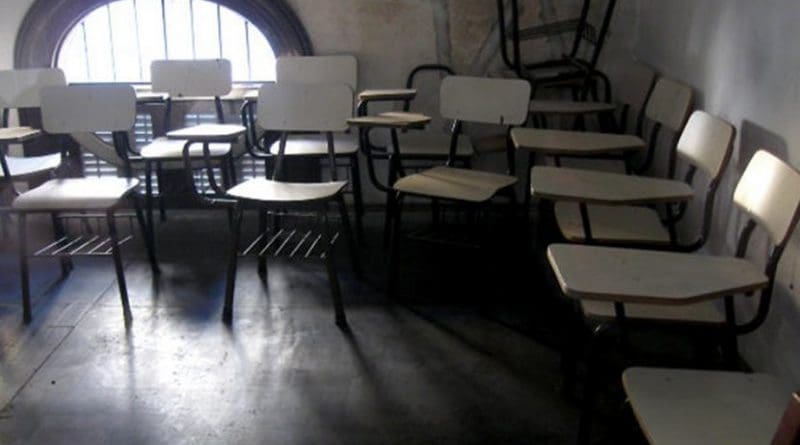Secondary Education And NEP-2020: Significance And Prospect – OpEd
The National Education Policy-2020 covers a wide range of educational aspects, including curriculum, assessment, teacher training, and more which include:
a. Flexibility in Curriculum: NEP-2020 emphasizes a shift from rote learning to holistic and multidisciplinary education. It suggests that high school students should have the flexibility to choose subjects across various streams, including arts, sciences, and vocational subjects. This aims to cater to individual interests and talents.
b. Reduced Content, Emphasis on Essential Learning: It outlines the reducing of the curriculum content to focus on essential learning outcomes, critical thinking, problem-solving, and conceptual understanding. This approach aims to reduce the burden on students and promote a deeper understanding of subjects.
c. Vocational Education: NEP-2020 emphasizes the integration of vocational education into the mainstream curriculum. This allows high school students to develop practical skills and be better prepared for various career options, not just traditional academic pathways.
d. Board Examinations: The policy suggests changes in the format and structure of board examinations to assess students’ understanding, application of knowledge, and critical thinking skills. It aims to make examinations more comprehensive and less stressful.
e. Teacher Training and Professional Development: NEP-2020 emphasizes the need for continuous teacher training and professional development to equip educators with the skills required to implement the policy effectively. This includes training teachers to promote experiential learning and creative teaching methods.
f. Multilingualism: The policy encourages the use of multiple languages for instruction, with a focus on promoting the mother tongue or regional language as the medium of instruction until at least Grade 5.
Aims and Objects
The new education policy implemented in 2020 has several objects in the larger interest of society which include:
a. Assessment Reforms: NEP-2020 proposes changes in the assessment system to move away from rote memorization and promote comprehensive evaluation. The policy suggests assessing students’ understanding, application of knowledge, and critical thinking skills.
b. Teacher Training and Professional Development: The policy emphasizes continuous teacher training and professional development to equip educators with innovative teaching methods and strategies. Well-trained teachers are essential for effective implementation of the policy.
c. Technology Integration: NEP-2020 recognizes the role of technology in education and encourages the use of digital tools and resources to enhance teaching and learning at the secondary level.
d. Holistic Development: The policy aims to foster holistic development by promoting cognitive, emotional, social, and physical growth. It encourages schools to offer a well-balanced education that goes beyond academics.
e. Equity and Inclusion: NEP-2020 emphasizes providing equal access to quality education for all students, regardless of their background and aims to address disparities in education and promote inclusive practices.
f. School Complexes: The policy suggests the creation of school complexes where secondary schools, higher secondary schools, and colleges are located in close proximity.
Significance of Secondary education
Secondary school education plays a crucial role in a student’s academic and personal development, and the New Education Policy 2020 (NEP-2020) brings significant reforms that aim to enhance the quality and impact of secondary education which contribute a lot in the area of teaching and learning: Significance of Secondary School Education:
a. Preparation for Higher Education: Secondary education lays the foundation for higher education. It provides students with the knowledge and skills needed to pursue specialized fields of study and career paths.
b. Critical Thinking and Decision-Making: Secondary education encourages critical thinking, problem-solving, and decision-making skills. Students learn to analyze information, evaluate options, and make informed choices.
c. Holistic Development: It promotes holistic development by fostering cognitive, emotional, social, and physical growth. Students have the opportunity to engage in extracurricular activities, sports, and arts, contributing to a well-rounded personality.
d. Vocational and Career Readiness: Secondary education prepares students for future careers by offering vocational courses and practical skills training. It helps them make informed choices about their career paths.
e. Personal Growth and Responsibility: Students learn to manage their time, set goals, and take responsibility for their learning. They develop self-discipline, independence, and a sense of accountability.
f. Global Competence: Secondary education equips students with the knowledge and skills required to thrive in a globalized world. It fosters cultural awareness, communication skills, and adaptability.
g. Citizenship and Civic Engagement: Students learn about civic responsibilities, democracy, and active citizenship. They develop an understanding of societal issues and are encouraged to participate in community service and social initiatives.
NEP-2020 and Secondary Education
Flexibility and Choice: NEP-2020 promotes flexibility in choosing subjects and areas of interest. This enables students to explore diverse fields and pursue their passions.
a. Reduction of Curriculum Load: NEP-2020 aims to reduce the curriculum load, allowing students to focus on a deeper understanding of concepts and critical thinking rather than rote memorization.
b. Vocational Integration: The policy emphasizes vocational education, enabling students to acquire practical skills and be better prepared for a variety of career options.
c. Experiential Learning: NEP-2020 encourages experiential learning, which enhances students’ understanding through hands-on activities, projects, and real-world applications.
d. Multilingualism: By promoting multilingualism and using the mother tongue or regional language as a medium of instruction, NEP-2020 enhances cognitive development and understanding.
e. Teacher Training: The policy emphasizes continuous teacher training to equip educators with innovative teaching methods, thus enhancing the overall quality of education.
f. Assessment Reform: NEP-2020 aims to reform assessment methods, focusing on comprehensive evaluation, critical thinking, and application of knowledge rather than solely relying on examinations.

